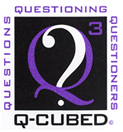SIMI participant pre-and post-self-assessment surveys document gain in understanding of science and the scientific process, improved attitudes and skills related to exploring the unknown, and greater comfort in doing and communicating about research.
SIMI 2021 participant performance ratings by faculty mentors rank good to excellent.
SIMI 2021 participant final presentations and reports rank very good to excellent.
SIMI 2021 participant ignorance logs generally show increased number and sophistication of questions over the summer.
Ignorance rubric (Ignorance Quotient IQ-cubed) under development for further evaluation of quality and progress of questions entered in SIMI and classroom ignorance logs.
Q-cubed Program Results: Statistics & Evaluation Photo
K-12 teacher SIMI Q-cubed classroom transformation plans rank good to excellent by project staff and consultants, and consultations provided for improvement and classroom implementation.
Follow-up: Of 787 disadvantaged SIMI high school student participants, 1987-2021 (54% Hispanic, 8% African American, 12% Native-American, 12% Asian/Pacific Islander, 13% Caucasian, 1% Other) 2% are still in high school, 98% are attending, have attended or completed 2-4 year colleges (the majority focusing on health- or science-related fields, many continuing research) and 1.5% have not been located. Of the 445 high school participants who have already completed 4-year college degrees, 58 are attending or have graduated from medical school and 176 have gone on to nursing, pharmacy, veterinary, and/or graduate school with many continuing to conduct research. A number of participants have credited SIMI as the most important influence in their career decisions and outcomes. The vast majority of the 118 K-12 science teacher participants, 1991-2004 (when program ended), indicated on the survey that they brought back the questioning approach to their classrooms and introduced new concepts and materials to encourage student questioning. Some received special teaching awards, career advancement, and further research opportunities; two have entered medical school, one in an MD/PhD program.

